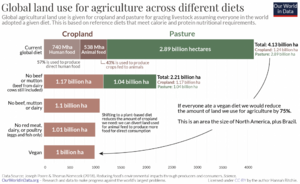Flexitarianism facts for kids
A flexitarian diet, also called a semi-vegetarian diet, is a way of eating that mostly focuses on plant-based foods. This means lots of fruits, vegetables, grains, and beans. People who eat this way also include a small amount of meat, but not every day. For example, a flexitarian might eat meat only a few times a week.
The word flexitarian is a mix of "flexible" and "vegetarian." It shows that this diet is less strict than being a full vegetarian.
Contents
What Does Flexitarian Mean?
The idea of being a flexitarian can mean slightly different things to different people. For example, some groups say a flexitarian is someone who doesn't eat meat, fish, or lunch meat at least one day a week. Others say it's someone who avoids meat (but might eat fish) three or more days a week.
Being a vegetarian means you never eat meat or any animal tissue. The term flexitarian is newer and became very popular in the 2010s. It was even added to a major dictionary in 2012. In 2003, a group called the American Dialect Society voted flexitarian as the most useful word of the year!
Other similar words you might hear for eating less meat include demi-vegetarianism, reducetarianism, and semi-veganism.
How Many People Are Flexitarian?
More and more people are choosing to be flexitarian. For example, in the Netherlands, a country in Europe, studies showed that the number of people who called themselves flexitarian grew a lot between 2011 and 2019.
This trend shows that many people are thinking about eating less meat. In 2012, about 35% of people in the Netherlands said they were purposely trying to eat less meat.
Why Choose a Flexitarian Diet?
People choose a flexitarian diet for many reasons. Some common ones include:
- Health: They believe it's good for their body and helps them stay healthy.
- Animals: They care about animal welfare and want to reduce the number of animals used for food.
- Environment: They want to help the planet. Producing meat can use a lot of land and water, and it can create pollution. Eating less meat can help the environment.
- Weight: Some people find it helps them manage their weight.
- Religion: Some religious beliefs encourage eating less meat.
Different Kinds of Flexitarian Diets
While flexitarian generally means eating less meat, some specific diets are similar but have their own rules:
- Demitarianism: This is when someone tries to eat half the amount of meat that is typical in their culture.
- Pescetarian diet: People on this diet eat fish and/or shellfish. They usually don't eat other meats like chicken or beef. They might or might not eat dairy and eggs.
- Pollotarian diet: Someone following this diet eats chicken and other poultry (like turkey) and usually eggs. They don't eat seafood or meat from mammals (like cows or pigs). People often choose this for health or environmental reasons.
- Macrobiotic diet: This diet is mostly plant-based, focusing on grains like brown rice, vegetables, and sometimes a little fish.
- Planetary health diet: This is a diet designed to be healthy for people and also good for the planet. It aims to feed everyone in the world without harming nature.
How Flexitarian Eating Works
All flexitarians eat a lot of plant-based foods. There isn't one strict rule about how little meat you have to eat to be called a flexitarian. Some people might eat red meat or chicken only once a week. Others might eat meat or fish three days a week.
For many people around the world, eating mostly plant-based meals is normal. This is often because plant foods are cheaper than meat. It's estimated that about 14% of people globally are flexitarian.
Flexitarianism in Society
In countries like the United Kingdom and Canada, more people are choosing to eat less meat or go completely meat-free. Studies in 2018 showed that a good number of people in the UK were following a "meat-free diet," including vegetarians, pescetarians, and vegans.
In 2019, a group of experts said that if more people adopted the flexitarian diet, it could "save lives, feed 10 billion people and all without causing catastrophic damage to the planet." This shows how important this way of eating is becoming for the future.
However, some strict vegetarians and vegans don't like the term flexitarian. They think it's confusing because it includes "vegetarian" but still allows eating animal meat.
See also
 In Spanish: Flexitarianismo para niños
In Spanish: Flexitarianismo para niños
- Meat-free days
- Meatless Monday
- Dawn Jackson Blatner
Sources
 | Selma Burke |
 | Pauline Powell Burns |
 | Frederick J. Brown |
 | Robert Blackburn |


